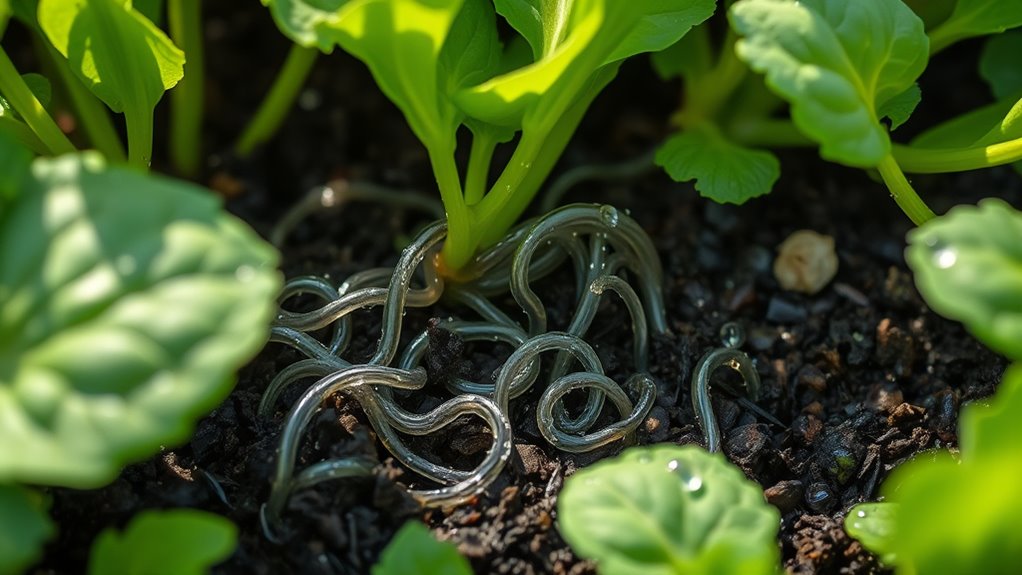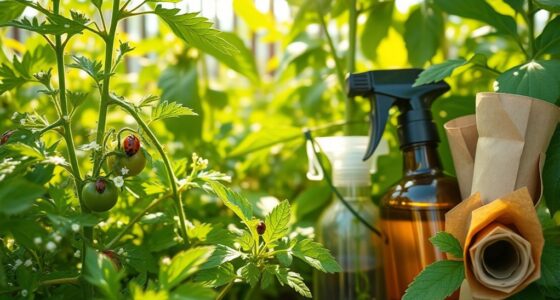Beneficial nematodes act as your garden’s microscopic bodyguards, hunting down underground pests naturally and safely. You can apply them by mixing with water and watering or spraying onto affected areas, preferably during cooler times. These tiny worms burrow into soil and pests, releasing bacteria that eliminate pests without harming beneficial insects or plants. Using nematodes helps create a balanced, healthy garden environment. Keep going to discover how to get the most out of these eco-friendly pest controllers.
Key Takeaways
- Beneficial nematodes are microscopic worms that naturally control soil-dwelling pests without chemicals.
- They target pests underground by releasing bacteria that kill pests from within.
- Easy to apply by mixing with water and watering into pest habitats during cooler parts of the day.
- Eco-friendly and safe for humans, pets, beneficial insects, and plants, supporting organic gardening.
- Enhance soil health and pest management, promoting resilient, thriving garden ecosystems.

Beneficial nematodes are natural biological agents that can effectively control soil-dwelling pests in your garden. These tiny, microscopic worms are a powerful tool in your pest control arsenal, targeting pests beneath the soil surface without the need for chemical pesticides. When you introduce beneficial nematodes into your garden, you’re not only tackling pests like grubs, beetles, and root maggots directly but also promoting healthier soil overall. They work by entering the pests’ bodies, releasing bacteria that kill them quickly, which means you get fast results without harming beneficial insects or your plants.
Using beneficial nematodes supports your goal of maintaining soil health. Unlike chemical treatments that can disrupt the delicate balance of microorganisms in the soil, these natural predators enhance the ecosystem by keeping pest populations in check naturally. As they reproduce within the pests, they help sustain a population of pest control agents that continue to work over time, reducing the need for repeated applications. This ongoing biological control helps keep the soil environment balanced and fertile, encouraging stronger plant growth and better nutrient absorption.
Beneficial nematodes naturally preserve soil health by controlling pests without disrupting beneficial microorganisms.
Applying beneficial nematodes is straightforward. You typically mix them with water and spray or water them into the affected areas of your garden, focusing on the soil where pests hide or lay eggs. For best results, apply them during cooler parts of the day, such as early morning or late evening, and when the soil is moist. This ensures the nematodes move efficiently through the soil and find their targets. Once introduced, they actively seek out pests, burrowing into the soil and infiltrating pest habitats, where they do their work behind the scenes.
By choosing beneficial nematodes, you’re opting for an eco-friendly pest control solution that aligns with organic gardening principles. They pose no risk to humans, pets, or beneficial insects like bees and butterflies. Furthermore, because they target pests underground, they avoid disrupting above-ground pollinator activities, supporting overall garden health. Over time, the natural pest suppression provided by nematodes can lead to a healthier, more resilient garden ecosystem. Additionally, understanding the contrast ratio of your soil and environment can help optimize conditions for beneficial organisms like nematodes, ensuring they thrive and work effectively.
Incorporating beneficial nematodes into your pest control strategy allows you to tackle stubborn soil pests effectively while nurturing the soil’s vitality. They’re a safe, sustainable, and efficient way to keep your garden thriving without the drawbacks of chemical pesticides, ultimately fostering a vibrant, balanced environment where plants can flourish.
Frequently Asked Questions
Are Beneficial Nematodes Safe for Pets and Children?
You’re wondering if beneficial nematodes are safe for pets and children. Rest assured, they are generally safe because they target specific soil pests and don’t harm humans or animals. For pet safety and children protection, follow application instructions carefully, avoid direct contact during treatment, and wash hands afterward. When used properly, beneficial nematodes provide an eco-friendly way to protect your garden without risking your loved ones’ health.
How Often Should I Apply Beneficial Nematodes?
You might think you need to apply beneficial nematodes every day, but that’s not true! Usually, you should do a single application every few weeks, depending on the pest population monitoring results. Keep an eye on your garden’s pests, and if they return or persist, reapply. Adjust the application frequency based on pest activity, ensuring your garden stays protected without overdoing it.
Can Beneficial Nematodes Control All Types of Garden Pests?
Beneficial nematodes are effective, but their pest specificity means they don’t control all garden pests. They target soil-dwelling pests like grubs, beetles, and cutworms, but have limitations when facing pests outside the soil. You should understand nematode limitations and match them with specific pests. They’re a great part of integrated pest management, but won’t eliminate every pest type, especially those above ground or resistant pests.
What Is the Ideal Soil Temperature for Nematode Effectiveness?
Think of soil temperature as the thermostat for nematode activity. The ideal range is between 55°F and 85°F, where they’re most active and effective. I once planted beneficial nematodes in early summer, and they quickly controlled pests because the soil was perfectly warm. When soil temperature drops below 50°F or rises above 90°F, nematode activity slows, reducing their pest-control power. Keep your soil warm for best results.
Do Beneficial Nematodes Work in Organic Gardening Systems?
Beneficial nematodes work well in organic gardening systems because they’re natural predators, making them compatible with organic certification standards. You’ll find that they effectively target soil-dwelling pests without harming beneficial insects or plants. Plus, they thrive in organic soils with good moisture and soil compatibility. By using nematodes, you support sustainable pest control that aligns with your organic gardening practices, keeping your garden healthy and pest-free naturally.
Conclusion
Think of beneficial nematodes as your garden’s secret security team, quietly patrolling underground and taking down pests before they cause trouble. I once watched these tiny warriors eliminate a stubborn grub infestation, transforming my garden overnight. Just like a vigilant security guard keeps your home safe, nematodes protect your plants naturally and effectively. Embrace these helpful allies, and you’ll enjoy a healthier, pest-free garden—without the need for harsh chemicals or sprays.









